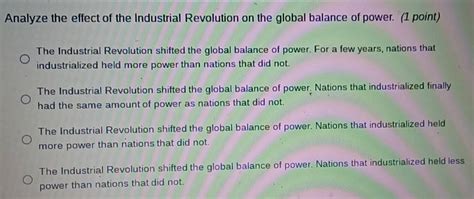The Industrial Revolution, a pivotal epoch that ignited profound technological advancements, not only transformed societies but also significantly altered the global balance of power dynamics. The advent of steam engines, factories, and mass production ushered in a new era of economic and military might, redefining global hierarchies and shaping the course of international relations for centuries to come.

Technological Supremacy and Economic Dominance
Industrialization bestowed upon nations that embraced it a formidable advantage in economic productivity and military prowess. Factories churned out manufactured goods at unprecedented rates, creating wealth and generating vast capital that could be invested in further technological development and military expansion. For instance, by the late 19th century, the United States, a leading industrial power, accounted for nearly half of the world’s manufacturing output. This economic dominance allowed industrialized nations to fund powerful navies and armies, solidifying their status as global hegemons.
Imperialism and Colonialism
The technological superiority and economic might of industrialized nations fueled a wave of imperialism and colonialism. Nations such as Britain, France, Germany, and the United States embarked on ambitious campaigns to acquire vast overseas territories, establishing colonies and extracting raw materials to fuel their industries. These colonies served as lucrative markets for manufactured goods and provided a steady supply of cheap labor, further enriching the imperial powers. By the early 20th century, European empires controlled over 80% of the world’s landmass.
Shifts in Global Alliances
The Industrial Revolution also triggered a reshuffling of global alliances and power blocs. Nations sought to align themselves with industrial powers for economic and military support. The United States, fueled by its burgeoning industrial might, emerged as a dominant player in international affairs, challenging the traditional European hegemony. Key alliances such as the Triple Alliance (Germany, Austria-Hungary, Italy) and the Triple Entente (France, Russia, Britain) were forged in the lead-up to the First World War, reflecting the geopolitical tensions and competition sparked by industrialization.
Emergence of New Global Powers
While Europe and North America dominated the early stages of industrialization, other regions began to emerge as industrial powerhouses in the late 19th and early 20th centuries. Japan, known for its rapid industrialization, became a formidable military force in the Asia-Pacific region. The Soviet Union, formed after the Russian Revolution, embarked on a massive industrialization drive, challenging the capitalist economies of the West. These rising powers brought new perspectives and challenges to the global balance of power, further complicating international relations.
Case Studies of Industrialization’s Impact on Global Power Dynamics
The United States as an Industrial Powerhouse
- By 1900, the United States had become the world’s leading industrial nation, accounting for over a third of global manufacturing output.
- Its booming economy and technological prowess fueled military expansion, making it a major player in international affairs.
- The United States emerged as a dominant force in the Western Hemisphere and a key player in global conflicts such as World War I and World War II.
The Rise of Imperial Germany
- Germany’s industrialization in the late 19th century transformed it into a major economic and military power.
- Its rapidly growing economy and powerful navy challenged British supremacy on the seas and contributed to geopolitical tensions in Europe.
- Germany’s aggressive foreign policy and desire for global expansionism led to its role as a central combatant in both World Wars.
Japan’s Industrialization and Military Power
- Japan’s rapid industrialization in the late 19th and early 20th centuries propelled it to become a formidable military force in the Asia-Pacific region.
- Its modern navy and army, combined with its industrial capacity, enabled Japan to expand its influence and wage war against China and Russia.
- Japan’s imperial ambitions and territorial conquests during World War II had a profound impact on the global balance of power.
Conclusion
The Industrial Revolution unleashed a cascade of technological, economic, and geopolitical transformations that profoundly shifted the world balance of power. Industrialized nations gained unprecedented advantages in economic productivity, military might, and colonial expansion. The rise of new global powers and the formation of new alliances reshaped international relations, laying the groundwork for future conflicts and geopolitical realignments. The legacy of industrialization continues to shape the global order today, as nations seek to harness technological advancements to maintain or enhance their power and influence.
